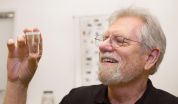(Press-News.org) The Society of Thoracic Surgeons, the Society of Cardiovascular Anesthesiologists, and the American Society of ExtraCorporeal Technology have released a set of clinical practice guidelines to address management of a patient's temperature during open heart surgery. The guidelines appear in the August issue of The Annals of Thoracic Surgery and were published simultaneously in two other journals.
Numerous strategies are currently used to optimally manage the practice of cooling the blood, temperature maintenance (control of body temperature during surgery), and rewarming of the patient's body temperature during cardiac surgical procedures that require use of the heart-lung machine (cardiopulmonary bypass, CPB); however, there were few evidence-based recommendations for temperature management.
As a result, the three societies assembled a task force of experts in cardiac surgery, anesthesiology, perfusion, and epidemiology across the United States and Australia. The goal was to address the manner in which the surgical team manages the patient's body temperature during cardiac surgery utilizing CPB with the heart-lung machine. The evidence used to create these guidelines comes from literature primarily involving coronary artery bypass grafting and heart valve surgical procedures.
"The importance of accurately recording and reporting temperature management during CPB cannot be overstated, and there are gaps in our knowledge concerning many aspects of temperature management," explained guidelines co-author Richard Engelman, MD, from Baystate Medical Center in Springfield, Mass.
The new clinical practice guidelines offer evidence-based recommendations that include:
The optimal site for temperature recording;
Avoidance of hyperthermia (overwarming);
Peak cooling temperature gradient and cooling rate; and
Peak warming temperature gradient and rewarming rate.
"Our new guidelines will help improve understanding of the relationship between temperature management and clinical outcomes, particularly its impact on brain function," said Dr. Engelman. "The guidelines also will increase patient awareness about the issue and help begin a dialogue between the patient and the cardiothoracic surgical team prior to surgery."
In addition, the new guidelines will help serve as the foundation for directed research into areas in which there was insufficient evidence to support a recommendation.
Guideline Development Process Outlined
In an editorial in the same issue of The Annals, three of the guideline authors outlined the development process and explained the importance of the recommendations to clinical practice.
"We have produced a comprehensive statement regarding best practices to date in cardiopulmonary bypass temperature management," said John W. Hammon, MD, a cardiothoracic surgeon from Wake Forest University in Winston-Salem, NC. "Our multidisciplinary group reviewed 3,321 abstracts and 935 complete articles for the most relevant and scientifically sound evidence."
Dr. Hammon suggested that subsequent guidelines should address kidney protection during CPB, neurologic protection, anticoagulation management, equipment selection, interdisciplinary collaboration, and safety in the conduct of CPB. "It is our expectation that these guidelines will be used by clinical teams to facilitate the assessment and improvement of care for the patients whom we collectively serve," he said.
The two other editorialists were Linda Shore-Lesserson, MD, Director of Cardiothoracic Anesthesiology at Northshore-Long Island Jewish Medical Center in Manhasset, NY, and Tim Dickinson, MS, Director of Clinical Performance Improvement, from SpecialtyCare in Nashville, TN.
INFORMATION:
http://www.sciencedirect.com/science/article/pii/S0003497515010140
Notes for editors
The Annals of Thoracic Surgery published by Elsevier.
Full text of the article is available to credentialed journalists upon request; contact Cassie McNulty cmcnulty@sts.org at +1 312 202 5865
For a copy of the STS Clinical Practice Guidelines, "The Society of Thoracic Surgeons, The Society of Cardiovascular Anesthesiologists, and The American Society of ExtraCorporeal Technology: Clinical Practice Guidelines for Cardiopulmonary Bypass--Temperature Management During Cardiopulmonary Bypass" contact Cassie McNulty at +1 312 202 5865 or cmcnulty@sts.org.
http://www.sciencedirect.com/science/article/pii/S0003497515010140
About The Annals of Thoracic Surgery
The Annals of Thoracic Surgery is the official journal of STS and the Southern Thoracic Surgical Association. Founded in 1964, The Society of Thoracic Surgeons is a not-for-profit organization representing more than 6,800 cardiothoracic surgeons, researchers, and allied health care professionals worldwide who are dedicated to ensuring the best possible outcomes for surgeries of the heart, lung, and esophagus, as well as other surgical procedures within the chest. The Society's mission is to enhance the ability of cardiothoracic surgeons to provide the highest quality patient care through education, research, and advocacy. http://www.annalsthoracicsurgery.org
About Elsevier
Elsevier is a world-leading provider of information solutions that enhance the performance of science, health, and technology professionals, empowering them to make better decisions, deliver better care, and sometimes make groundbreaking discoveries that advance the boundaries of knowledge and human progress. Elsevier provides web-based, digital solutions -- among them ScienceDirect, Scopus, Elsevier Research Intelligence and ClinicalKey -- and publishes more than 2,500 journals, including The Lancet and Cell, and more than 33,000 book titles, including a number of iconic reference works. Elsevier is part of RELX Group plc, a world-leading provider of information solutions for professional customers across industries. http://www.elsevier.com
This news release is available in French. While it is already possible to obtain in vitro pluripotent cells (ie, cells capable of generating all tissues of an embryo) from any cell type, researchers from Maria-Elena Torres-Padilla's team have pushed the limits of science even further. They managed to obtain totipotent cells with the same characteristics as those of the earliest embryonic stages and with even more interesting properties. Obtained in collaboration with Juanma Vaquerizas from the Max Planck Institute for Molecular Biomedicine (Münster, Germany), these ...
Women who exercised during their teen years were less likely to die from cancer and all other causes during middle-age and later in life, according to a new study by investigators at Vanderbilt University Medical Center and the Shanghai Cancer Institute in China.
The study was published online July 31 in Cancer Epidemiology, Biomarkers & Prevention, a journal of the American Association of Cancer Research.
Lead author Sarah Nechuta, Ph.D., MPH, assistant professor of Medicine in the Vanderbilt Epidemiology Center, said understanding the long-term impact of modifiable ...
GAINESVILLE, Fla. -- UF Health researchers have found that care linked to heart attacks and chronic obstructive pulmonary disease, or COPD, among disabled adults covered by Medicaid has improved with the expansion of a new health care program in Texas over the last decade.
This approach to health care delivery is growing in popularity across the country, with the number of states implementing similar programs increasing from eight in 2004 to 18 in 2014. These programs have two components: managed care and home- and community-based health services. Managed care is reputed ...
Toxic is bad. Or is it? New studies of seagrasses reveal that they are surprisingly good at detoxifying themselves when growing in toxic seabed. But if seagrasses are stressed by their environment, they lose the ability and die. All over the world seagrasses are increasingly stressed and one factor contributing to this can be lack of detoxification.
Seagrass meadows grow along most of the world's coasts where they provide important habitats for a wide variety of life forms. However in many places seagrass meadows have been lost or seriously diminished and in several places, ...
Increasing the number of female speakers at a scientific conference can be done relatively quickly by calling attention to gender disparities common to such meetings and getting more women involved in the conference planning process, suggests a Johns Hopkins Bloomberg School of Public Health researcher.
Reporting online Aug. 4 in the journal mBio, Arturo Casadevall, MD, PhD, professor and chair of the W. Harry Feinstone Department of Molecular Microbiology and Immunology at the Bloomberg School, lays out how the American Society of Microbiology General Meeting was able ...
COLUMBUS, Ohio - New mothers take a close look at their personal relationship with their husband or partner when deciding how much they want him involved in parenting, new research finds.
The study found that mothers limited the father's involvement in child-rearing when they perceived their couple relationship to be less stable. Mothers also limited fathers who were less confident in their own ability to raise children.
The bottom line is that new mothers are assessing their partners' suitability to be a parent, said Sarah Schoppe-Sullivan, co-author of the study and ...
When it comes to courting, one common spider species is quick to learn, and that learning process involves eavesdropping on the visual cues of rivals to win their mate. The latest discovery in a research partnership represented by Alma College, The Ohio State University at Newark and the University of Cincinnati is the featured article in the August issue of the international research journal Animal Behaviour.
Previous studies by the researchers explored how brush-legged wolf spiders (Schizocosa ocreata) used visual eavesdropping to try to outdo a male rival's leg-tapping ...
Cholera is a diarrhoeal disease that is caused by an intestinal bacterium, Vibrio cholerae. Recently an outbreak of cholera in Haiti brought public attention to this deadly disease. In this work, the goal of our differential equation model is to find an effective optimal vaccination strategy to minimize the disease related mortality and to reduce the associated costs. The effect of seasonality in pathogen transmission on vaccination strategies was investigated under several types of disease scenarios, including an endemic case and a new outbreak case. This model is an extension ...
WASHINGTON -- Chronic marijuana use by teenage boys does not appear to be linked to later physical or mental health issues such as depression, psychotic symptoms or asthma, according to a study published by the American Psychological Association.
Researchers from the University of Pittsburgh Medical Center and Rutgers University tracked 408 males from adolescence into their mid-30s for the study, which was published in Psychology of Addictive Behaviors.
"What we found was a little surprising," said lead researcher Jordan Bechtold, PhD, a psychology research fellow ...
HIV can continue to grow in patients who are thought to be responding well to treatment, according to research by the University of Liverpool.
During treatment for HIV the virus hides in blood cells that are responsible for the patient's immune response. The virus does this by inserting its own genetic information into the DNA of the blood cells, called CD4 Tlymphocytes.
The study by the University's Institute of Infection and Global Health measured the levels of integrated HIV in the CD4 cells of patients undergoing uninterrupted treatment for up to 14 years, and ...

